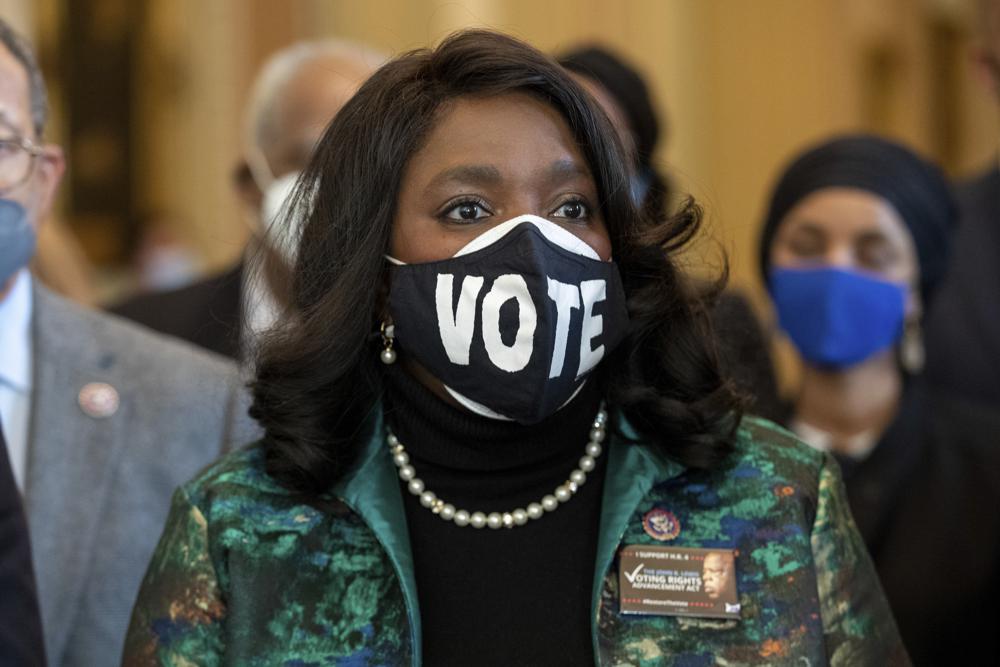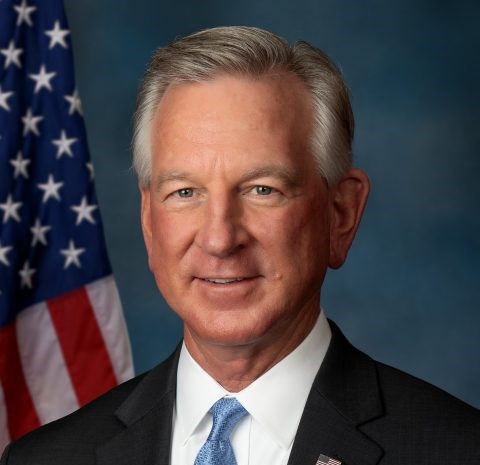Katie Britt and Senate colleagues introduce a bipartisan bill to cut compensations from failed bank executives

U.S. Senator Katie Britt on Friday joined Senator J.D. Vance (R-Ohio), Senator Elizabeth Warren (D-Massachusetts), and a bipartisan group of colleagues in introducing the Failed Bank Executives Clawback Act. This legislation would enable federal regulators to claw back compensation from bank executives who are responsible for the reckless decisions that resulted in their institution’s failures. “When executives drive financial institutions into failure with reckless business practices, they shouldn’t be allowed to use their golden parachutes to escape responsibility while their customers, their employees, and hardworking American families are left footing the bill for the failure of their bank,” said Sen. Britt. “This commonsense legislation will dissuade risky bank mismanagement and ensure that bad actors are held accountable.” “The executives responsible for running their banks into the ground are sitting on millions of dollars in compensation and bonuses. Meanwhile, the American people are bearing the financial burden for their excessive risk-taking and gross mismanagement,” said Sen. Vance. “This legislation would right that wrong and ensure that failed bank executives are held accountable for the collapse of their institutions – not the American taxpayer.” “Nearly three months after the collapse of Silicon Valley Bank, a bipartisan group of Senators is demonstrating a serious commitment to pass legislation requiring financial regulators to claw back pay from executives when they implode their bank,” said Sen. Warren. “Congress must answer the President’s call for stronger laws to hold failed bank executives accountable, and I’m determined to work with lawmakers on both sides of the aisle in the Senate Banking, Housing, and Urban Affairs Committee to deliver change.” The bill would expand the existing authority of the Federal Deposit Insurance Corporation (FDIC) to claw back the compensation of bank executives when they are found to have substantially contributed to the collapse of a financial institution by engaging in reckless business practices. Any funding that is clawed back will be directed to the FDIC’s Deposit Insurance Fund. This legislation was introduced in light of the recent collapses of Silicon Valley Bank (SVB) in California and Signature Bank in New York. Sponsors claim that considering the cost of the institutions’ collapse to the FDIC’s Deposit Insurance Fund and impact to the broader banking sector, this legislation is needed to deter future bad actors. Sen. Britt questioned former SVB CEO Greg Becker at a recent Banking Committee hearing, demanding answers about his responsibility in the bank’s collapse and his plans to give back the $1.5 million bonus he received. “If the team would have known it was going to be the fastest rate in history, I believe they would have considered different decisions,” Becker testified. “Senator, I was the CEO of Silicon Valley Bank. I take responsibility for what ultimately happened.” Co-sponsors of the bill also include U.S. Senators Bob Menendez (D-New Jersey), Mark Warner (D-Virginia), Kevin Cramer (R-North Dakota), Chris Van Hollen (D-Maryland), Tina Smith (D-Minnesota), Raphael Warnock (D-Georgia), John Fetterman (D-Pennsylvania.), Catherine Cortez Masto (D-Nevada), Josh Hawley (R-Missouri.), and Mike Braun (R-Indiana). To connect with the author of this story or to comment, email brandonmreporter@gmail.com.
Democrats’ letter urges amendment to National Defense Authorization Act

Vetting human rights security cooperation programs is the focus of a letter sent to the House and Senate Armed Services Committees by a pair of Democrats. California Congresswoman Sara Jacobs, Maryland Senator Chris Van Hollen, and 13 other federal legislators are urging the committees to include their amendment that would require vetting of human rights in cooperation programs within the fiscal year 2023 National Defense Authorization Act conference pact. According to the letter sent to Chairman Jack Reed, D-RI; Chairman Adam Smith, D-WA; Ranking Member Jim Inhofe, R-OK; and Ranking Member Mike Rogers, R-AL, members are pushing for House-ratified provisions of the Upholding Human Rights Abroad Act that would, if enacted, close loopholes in the Leahy Laws that would “guarantee human rights vetting” of U.S. security assistance that would prevent taxpayer funds from aiding human rights abusers. “This provision would strengthen the U.S. commitment to human rights by increasing vetting measures to ensure that recipients of U.S. support have not committed human rights violations or violations of international humanitarian law,” the members wrote in the letter. “Consistent with the Department of Defense Leahy Law, this provision allows for the use of a national security waiver.” The members wrote that the provisions would give the flexibility that would “continue to address U.S. national security priorities” that would allow the State Department to “undertake this additional vetting.” “This provision would help prevent civilian harm, ensure partner compliance with human rights, and improve intended long-term outcomes toward good governance, rule of law, peace, and human rights promotion,” the members wrote. The letter was also signed by Senators Dick Durbin, D-Ill; Patrick Leahy, D-VT; and Richard Blumenthal, D-CT; and Representatives Jason Crow, D-CO; Chrissy Houlahan, D-PA; Tom Malinowski, D-NJ; Joaquin Castro, D-TX; Albio Sires, D-NJ; Dina Titus, D-NV; Ted Lieu, D-CA; Colin Allred, D-TX-32; Gerry Connolly, D-VA; and Dean Phillips, D-MN. Republished with the permission of The Center Square.
High court’s Alabama ruling sparks alarm over voting rights

The Supreme Court’s decision to halt efforts to create a second mostly Black congressional district in Alabama for the 2022 election sparked fresh warnings Tuesday that the court is becoming too politicized, eroding the Voting Rights Act and reviving the need for Congress to intervene. The Supreme Court’s conservative majority put on hold a lower court ruling that Alabama must draw new congressional districts to increase Black voting power. Civil rights groups had argued that the state, with its “sordid record” of racial discrimination, drew new maps by “packing” Black voters into one single district and “cracking” Black voters from other districts in ways that dilute their electoral power. Black voters are 26% of Alabama’s electorate. In its 5-4 decision late Monday, the Supreme Court said it would review the case in full, a future legal showdown in the months to come that voting advocates fear could further gut the protections in the landmark Civil Rights-era law. It’s “the latest example of the Supreme Court hacking away at the protections of the voting rights act of 1965,” said Sen. Dick Durbin, D-Ill., chairman of the Judiciary Committee. “Congress must act. We must restore the Voting Rights Act.” The outcome all but ensures Alabama will continue to send mostly white Republicans to Washington after this fall’s midterm elections and applies new pressure on Congress to shore up voter protections after a broader elections bill collapsed last month. And the decision shows the growing power of the high court’s conservative majority as President Joe Biden is under his own pressures to name a liberal nominee to replace retiring Justice Stephen Breyer. Rep. Terri Sewell, the only Black representative from Alabama, said the court’s decision underscores the need for Congress to pass her bill, the John R. Lewis Voting Rights Advancement Act, to update and ensure the law’s historic protections. “Black Alabamians deserve nothing less,” Sewell said in a statement. The case out of Alabama is one of the most important legal tests of the new congressional maps stemming from the 2020 census count. It comes in the aftermath of court decisions that have widely been viewed as chiseling away at race-based protections of the Voting Rights Act. Alabama and other states with a known history of voting rights violations were no longer under federal oversight, or “preclearance,” from the Justice Department for changes to their election practices after the court, in its 2013 Shelby v. Holder decision, struck down the bill’s formula as outdated. As states nationwide adjust their congressional districts to fit population and demographic data, Alabama’s Republican-led Legislature drew up new maps last fall that were immediately challenged by civil rights groups on behalf of Black voters in the state. Late last month, a three-judge lower court, which includes two judges appointed by former President Donald Trump, had ruled that the state had probably violated the federal Voting Rights Act by diluting the political power of Black voters. This finding was rooted, in part, in the fact that the state did not create a second district in which Black voters made up a majority or close to it. Given that more than one person in four in Alabama is Black, the plaintiffs had argued the single Black district is far less than one person, one vote. “Black voters have less opportunity than other Alabamians to elect candidates of their choice to Congress,” the three-judge panel wrote in the 225-page ruling. The lower court gave the Alabama legislature until Friday to come up with a remedial plan. Late Monday, the Supreme Court, after an appeal from Alabama, issued a stay. Justices Brett Kavanaugh and Samuel Alito, part of the conservative majority, said the lower court’s order for a new map came too close to the 2022 election. Chief Justice John Roberts joined his three more liberal colleagues in dissent. “It’s just a really disturbing ruling,” said Sen. Cory Booker, D-N.J., a member of the Judiciary Committee, who called the Supreme Court’s decision “a setback to racial equity, to ideals of one person, one vote.” Rep. Joyce Beatty, D-Ohio, and the chair of the Congressional Black Caucus said the decision “hits at the guts of voting rights.” She told The Associated Press: “We’re afraid of what will happen from Alabama to Texas to Florida and even to the great state of Ohio.” White House Press Secretary Jen Psaki said the court decision exposes the need for Congress to legislate to protect voting rights. The erosion of those rights is “exactly what the Voting Rights Act is in place to prevent.” Critics went beyond assailing the decision at hand to assert that the court has become political. “I know the court likes to say it’s not partisan, that it’s apolitical, but this seems to be a very political decision,” said Democratic Sen. Chris Van Hollen of Maryland. Rep. Hakeem Jeffries, D-N.Y., tweeted that the court majority has “zero legitimacy.” Rep. Barbara Lee, D-Calif., tweeted that the court’s action was “Jim Crow 2.0.” Alabama Republicans welcomed the court’s decision. “It is great news,” said Rep. Mo Brooks, who is running for the GOP nomination for Senate. He called the lower court ruling an effort to “usurp” the decisions made by the state’s legislature. The justices will, at some later date, decide whether the map produced by the state violates the voting rights law, a case that could call into question “decades of this Court’s precedent” about Section 2 of the act, Justice Elena Kagan wrote in dissent. Section 2 prohibits racial and other discrimination in voting procedures. Voting advocates see the arguments ahead as a showdown over voting rights they say are being slowly but methodically altered by the Roberts court. The Supreme Court in the Shelby decision did away with the preclearance formula under Section 5 of the Voting Rights Act. And last summer, the conservative majority in Bronvich vs. the Democratic National Committee upheld voting limits in an Arizona case concerning early ballots that a lower court had found discriminatory under Section 2. With the Alabama case, the court
Tommy Tuberville joins other leaders to change sexual assault investigations in the military

U.S. Senator Tommy Tuberville has joined a bipartisan group of senators to support a bill that will change the way the military conducts sexual assault investigations and prosecutions. Tuberville, a member of the Senate Armed Services Committee Subcommittee on Personnel, joined U.S. Senators Kirsten Gillibrand (D-NY), Chuck Grassley (R-IA), Joni Ernst (R-IA), Richard Blumenthal (D-CT), Ted Cruz (R-TX), Jeanne Shaheen (D-NH), Mark Kelly (D-AZ), and 28 other Senators to introduce the Military Justice Improvement and Increasing Prevention Act. According to the press release, the legislation “keeps the prosecution of sexual assault crimes within the military but moves the decision to prosecute to independent, trained, professional military prosecutors, and provides for several new prevention provisions such as better training for commanders and increased physical security measures, while ensuring that commanders still have the ability to provide strong leadership and ensure a successful command climate.” Tuberville stated, “Our men and women in uniform sacrifice every day to keep us safe, often working in some pretty unsafe places around the world. The last thing they should be worrying about is whether they’re unsafe within their ranks, and they certainly shouldn’t have to fear retaliation if they report a sexual assault. This bill is what happens when a bipartisan group of senators come together to get something done. I’m thankful that Senator Gillibrand and Senator Ernst have led the charge, and I’m glad to join my colleagues in support of this bill that will help improve the way the military handles sexual assaults so survivors can get the justice they deserve.” The bill was introduced in 2019, but did not receive a vote. Specifically, the legislation would: Move the decision on whether to prosecute serious crimes to independent, trained, and professional military prosecutors, while leaving misdemeanors and uniquely military crimes within the chain of command. Ensure the Department of Defense supports criminal investigators and military prosecutors through the development of unique skills needed to properly handle investigations and cases related to sexual assault and domestic violence. Require the Secretary of Defense to survey and improve the physical security of military installations– including locks, security cameras, and other passive security measures – to increase safety in lodging and living spaces for service members. Increase, and improve training and education on military sexual assault throughout our armed services. Kirsten Gillibrand stated on Twitter, “Here’s a bipartisan mission we can all support: Survivors of military sexual assault deserve justice. I’m proud to have @JoniErnst join me this week to introduce our new, improved bill to reform the military justice system and invest in prevention.” Here’s a bipartisan mission we can all support: Survivors of military sexual assault deserve justice. I’m proud to have @joniernst join me this week to introduce our new, improved bill to reform the military justice system and invest in prevention. https://t.co/pYYUL6IRyA — Kirsten Gillibrand (@SenGillibrand) April 27, 2021 The legislation is cosponsored by U.S. Senators Kirsten Gillibrand (D-NY), Chuck Grassley (R-IA), Joni Ernst (R-IA), Richard Blumenthal (D-CT), Ted Cruz (R-TX), Jeanne Shaheen (D-NH), Tammy Baldwin (D-WI), Chris Van Hollen (D-MD), Angus King (I-ME), Michael Braun (R-IN), Dick Durbin (D-IL), Tammy Duckworth (D-IL), Michael Bennet (D-CO), Rand Paul (R-KY), Chris Coons (D-DE), Mark Kelly (D-AZ), Sherrod Brown (D-OH), Bob Casey Jr. (D-PA), Maggie Hassan (D-NH), Mazie K. Hirono (D-HI), Amy Klobuchar (D-MN), Patrick Leahy (D-VT),Elizabeth Warren (D-MA), Ron Wyden (D-OR), Cynthia Lummis (R-WY), Dianne Feinstein (D-CA), Catherine Cortez Masto (D-NV), Raphael Warnock (D-GA), Alex Padilla (D-CA), Shelley Moore Capito (R-WV), Gary C. Peters (D-MI), Tim Kaine (D-VA), Tina Smith (D-MN), Bob Menendez (D-NJ), and Martin Heinrich (D-NM).
Trump Returns to Washington to Face a Pair of Challenges

Donald Trump faces a new crisis in the Middle East and an upcoming Impeachment Trial.
Terri Sewell, Bradley Byrne re-introduce Workforce Development Tax Credit Act
A bipartisan duo of Alabama congressional members — Democratic Rep. Terri Sewell and Republican Rep. Bradley Byrne — is bringing back the Workforce Development Tax Credit Act, H.R. 1781. It would help stimulate employment and increase work-skills development by creating incentives for employers to hire apprentices. “A strong manufacturing sector is crucial for our nation’s economic growth and prosperity,” Sewell said in a news release. “The Workforce Development Tax Credit Act encourages businesses to work with community colleges and universities to develop apprenticeship programs that will lead to more skilled workers. Emphasizing skills training will enable our country to maintain its competitive edge, and help bring more Americans into the middle class. I am proud to sponsor this bill with Bradley Byrne, my friend and fellow Alabamian, and I look forward to its passage.” According to a study by the Washington, D.C.-based Manufacturing Institute, almost 3.5 million U.S. manufacturing jobs will need to be filled during the next decade. If current trends prevail, though, about 2 million of those jobs will go unfilled because of a skilled labor shortage. Sewell and Byrne were joined in supporting their bill to try to stem that tide by Manufacture Alabama, a pro-growth consortium of Alabama’s leading manufacturers. In a Tweet from the group’s @ManufactureAL Twitter account, MA President George Clark issued a statement in praise of the members’ efforts to stimulate activity in the workforce: “I support the Workforce Development Tax Credit Act, as it is in total alignment with the goals of the Alabama Workforce Investment Board and the recommendations made by the Alabama Workforce Council regarding public/private partnerships,” said Clark, who also holds leadership positions on the AWC and AWIB. The bill is also co-sponsored by a number of lawmakers of across the country, including U.S. Rep. Chris Van Hollen, ranking member of the powerful House Budget Committee. “Apprenticeship programs are a critical tool to bridge the skills gap and help employers train and hire workers for jobs that strengthen our economy,” Van Hollen said in a prepared statement. “I am proud to stand with Representatives Sewell and Byrne and support this common-sense approach to incentivize apprenticeships and help connect workers to good-paying jobs in my home state and across the country.”


